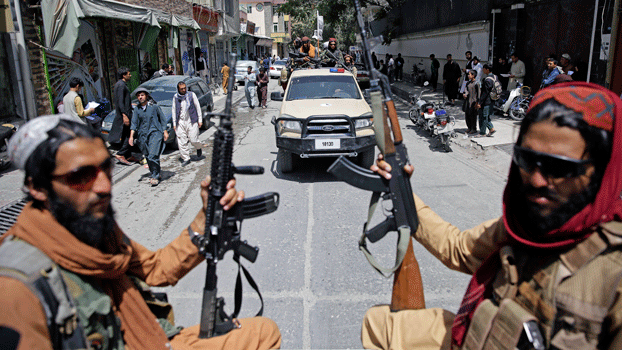Uyghurs living in Afghanistan are terrified that the Taliban’s takeover of the country could mean they will be extradited to face harsh punishment in China or suffer other dangers in the war-torn South Asian nation.
Since Taliban militants seized control of the Afghanistan following the pullout of U.S. forces earlier this month, triggering an unabated chaotic exodus of thousands of civilians and foreigners, advocacy groups have been saying they fear the worst for the country’s estimated 2,000 Uyghurs.
The 12 million Uyghurs in northwestern China’s Xinjiang Uyghur Autonomous Region (XUAR) have since 2017 been the target of a systematic assimilation campaign of forced birth control and sterilization, forced labor, and mass incarceration that has sent as many as 1.8 million of the Turkic Muslims through a network of internment camps.
A Uyghur woman who has been living in Kabul with her Afghan husband for more than 10 years told RFA’s Uyghur Service that she fears both Taliban repression and mistreatment of women and being returned to China on account of their status as “Chinese migrants.”
“I’m terrified they’re going to come looking for me because I ‘belong to China,’” said the woman, who requested anonymity out of fear of reprisal for speaking to the media.
“It’s possible they could kill me or that they could return me to China,” she said.
The roughly 80 Uyghur families in Kabul are living in confusion and fear about life under the Taliban, says Mamat, a Uyghur man who was born in Afghanistan to parents who had parents had immigrated there in the 1960s.
Mamat, who lives in Kabul with his own family, said he was beaten and barely escaped an attack by Taliban militants Sunday when he went to buy bread for his children.
“You’re seeing that there are airplanes flying all over the place here,” he said, referring to airlifts conducted by the U.S. and other countries to evacuate their citizens and Afghans who have worked for them.
“Things look very chaotic here, but how are we [Uyghurs] doing?” Mamat asked.
“Kazakhstan is taking Kazakhs out of Afghanistan, Uzbekistan is taking Uzbeks out, Turkey and all the other countries are taking their own citizens away, but no one is even asking about how we’re doing. No one is helping us,” he added.
Uyghurs in the South Asian country are also facing new threats, said a Turkey-based Uyghur who was told by relatives in Mazar-e-Sharif, Afghanistan’s fourth-largest city, that Taliban militants now are going into homes and kidnapping girls.
“It’s terrifying there. For example, they’re wondering what’s going to happen if [the Taliban] comes after their daughters, wants to force them to marry them, and then take them away,” said Abdulaziz, who fled Afghanistan for Turkey two years ago.
The Chinese identification documents held by many Uyghurs in Afghanistan have expired, though they still say “Chinese Turkestani migrant” on them, Abdulaziz said.
“If this information were to fall into their hands in the coming days, China might say that there are such and such Uyghurs who have left Xinjiang and that they want them to turn us over,” he said.
Among the Afghanistan-based Uyghurs’ biggest fears is being branded as members of the East Turkestan Islamic Movement (ETIM), a key tactic China uses to discredit accounts of rights abuses of the ethnic minority in the XUAR, say analysts.
Seeking Chinese support to overthrow the Taliban in the wake of the 9/11 attacks by Afghanistan-based Al Qaeda militants, the United States put the ETIM on its list of terrorist organizations in 2002 per Beijing’s request.
In October 2020, however, the U.S. State Department removed the ETIM from its designated terrorist list, with a U.S. official saying that “for more than a decade, there has been no credible evidence that the ETIM continues to exist.”
“The CCP has used ETIM as a bogeyman to justify its campaign against Uyghurs that has culminated into an ongoing genocide,” tweeted Michael Sobolik, a fellow in Indo-Pacific Studies at the American Foreign Policy Council, a conservative think tank in Washington, D.C., referring to the Chinese Communist Party.
“The Taliban’s ascent, coupled w/ our bungled withdrawal, could spell disaster for the Uyghurs,” he wrote.
Since January, the U.S. State Department and the parliaments of six other democratic countries have determined that the Chinese government is perpetrating genocide against Uyghurs in the XUAR. China denies these charges and says its policies are combating religious extremism.
Beijing has engaged with the Taliban diplomatically, but has indicated it will not consider recognizing the regime in the Afghan capital Kabul until a government has been formed.
“We’re very concerned about the situation of Uyghurs in Afghanistan,” said Omer Khan, founder of the Pakistan-based Omer Uyghur Trust.
“I’m working to get people to Pakistan, but even those who make it there are still in a problematic situation,” he told RFA. The 20 Uyghur families that have settled in Pakistan recently continue to live in fear and remain in a dangerous situation, he added.
“Airplanes are coming in from Turkey, Germany, from the United States. They’re taking Afghans out, but they’re not taking Uyghurs,” said Khan.
Reported by Gulchehra Hoja for RFA’s Uyghur Service. Translated by the Uyghur Service. Written in English by Roseanne Gerin.
Source: Radio Free Asia



